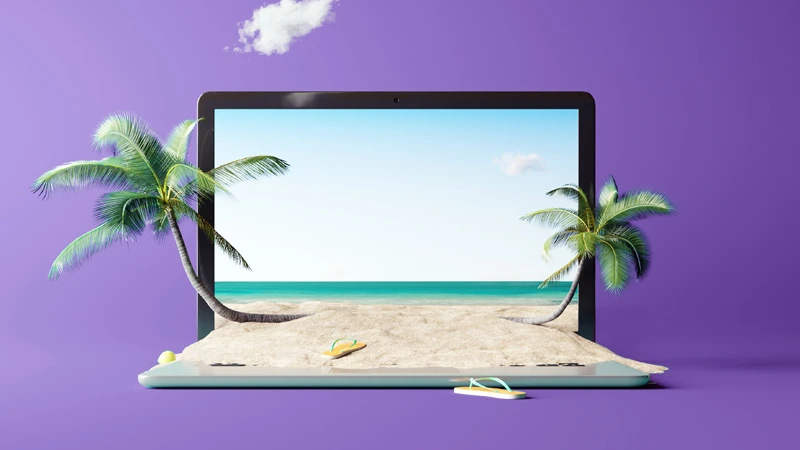Sustainable travel, bleisure trips and other travel trends to watch for in 2022

In 2020, the travel industry lost almost $5 trillion and 62 million jobs, according to the World Travel and Tourism Council (WTTC).
Two years later, airlines and hospitality brands are still trying to regain their footing as people around the world start traveling again. Staffing shortages, new business models, technical difficulties, evolving customer experience (CX) expectations and the growing demand for sustainable travel options are just some of the hurdles facing the travel and tourism industry as it strives to recover.
How the industry will behave over the next couple of years is difficult to predict with any degree of certainty. There are, however, some emerging trends that light the path to a new future of travel.
How travelers have changed
As more and more people begin to make those long awaited travel plans, it’s critical that brands understand what customers value most. Here’s a closer look at some of the key trends in the industry today:
Flexibility and transparency are key
Whereas flight changes or last-minute hotel cancellations used to incur penalties, the pandemic saw airlines and hospitality brands cut travelers some slack.
While some brands, such as United, have made their no-change-fee policies permanent, others have monetized flexibility by offering more purchasing tiers and options; for instance, some airlines now offer forms of “cancellation insurance” for an add-on fee towards the end of the ticket-buying journey. And according to Jonathan Jones, Head of U.S. Publishing at Travelzoo, travelers are willing to take on those extra costs for some more piece of mind.
“Consumers have become used to booking flexible travel,” said Jones during a Skift Live panel. “It’s not a stretch to say operators have found it harder and harder to remain flexible as the world continues to move to a post-pandemic state of mind. The positive here is that consumers, the world over, are willing to pay for that flexibility.”
This principle of allowing passengers to determine what kind of flexibility they need — and then giving them self-serve options to access it without any fuss or contacting an agent — is a sign of a maturing model for flexible customer service in the travel industry.
Adventure travel company G Adventures’ managing director of EMEA, Brian Young, said during the same Skift Live panel that giving passengers greater control and more opportunity to self-serve will be pivotal in creating better customer experiences and reducing the challenges customer service teams are facing due to the influx in travel volume. “When I think about flexibility, it isn’t just about how flexible your bookings and terms and conditions are, it’s actually about how flexible you are as an organization to work with, so that the customer can take an amount of control,” Young added. “Technology, in terms of how people adapt their website and the customer journey post-booking is going to be really important.”
Sustainability is top-of-mind
A demand for sustainable travel was starting to take flight prior to the pandemic, but COVID-19 really drove home the impacts of tourism. As Skift put it, “Travel is now colliding with some of the biggest challenges of the present and future — climate change, equitable and sustainable growth of travel, human mobility around the world — and creating new fault lines.”
Balancing renewed fervor for bucket-list travel with the health and safety of those living in coveted destinations is an ongoing project. A 2022 survey by marketing communications company, MMGY, reported that 81% of active leisure travelers said they’d consider changing their travel habits to be more conscientious of the environment, and 60% said they’d be willing to spend more with travel and tourism providers who’ve proven their commitment to the environment.
Travelers, however, aren’t only concerned about environmental sustainability. A 2022 report by Skift and Expedia says two-thirds of travelers see sustainable travel as a way to support local economies and communities. According to that survey, a significant proportion of travelers (49%) used their purchasing power to support local stores and restaurants, rather than chains. This approach — also referred to as integrated sustainable travel — is expected to grow in the coming years, meaning the industry’s post-pandemic recovery will be closely tied to a sustainable travel comeback. As such, communicating the principles, value and significance of sustainability options will become a more important part of customer experience delivery.
Bleisure has evolved
Bleisure travel — a term which describes adding extra days of rest and relaxation to business trips — started taking off prior to the pandemic. The rise of remote work under COVID-19 has allowed for the concept of bleisure to further evolve, and according to customer experience futurist, Blake Morgan, the trend is poised to take over traditional business travel in 2022 and beyond.
What is unique about bleisure travelers? Deloitte’s 2022 travel outlook notes that they tend to travel solo or with just one other person — conditions that make it easier to blend work and play. Additionally, they tend to take more, and longer trips than other types of travelers. These longer trips, the need for a quiet and comfortable space to work, as well as fast and reliable Wi-Fi, could buoy the popularity of private rentals.
As bleisure continues to grow in popularity, travel and hospitality brands will be wise to tailor their pricing and CX to suit travelers hitting the road for longer, solo trips.
Travelers want a tech-assisted experience
The pandemic led the charge on touchless/contactless service. Now it’s here to stay. Travelers are looking to travel and hospitality brands to capitalize on mobile technology for service delivery. For instance, hotels are using smartphone apps to enable guests to bypass lines using self-serve check-in and room selection features, with mobile devices doubling as room keys. And in order to provide around-the-clock service, some hotels are relying on app-based guest chatbots and live-chat tools to augment their concierge desks.
Commonly referred to as “phygital” customer experience, brands using tech to optimize and finesse self-serve choices while still bringing in the human element for a high-touch experience are primed for success.
Travelers are looking to amplify their experiences
After two years of staring at the same four walls, people are craving travel in a big way. For many, that means splurging on extras they may not have bothered with before 2020. Tripadvisor site data shows Americans are expected to spend an additional 29% on 2022 trips when compared to pre-pandemic travel.
“Travelers want upgrades. They are willing to pay more for the beach villa instead of the garden view room,” said Jones. “The lowest price option is still the carrot that amps up the excitement about a deal, but once travelers have decided to actually take the trip, they are indeed looking for ways to make their experiences even more amazing.”
This is indicative of a larger trend: travel personalization. According to a survey conducted by The Harris Poll on behalf of TELUS Digital, a majority of Americans are likely to pay more for personalized experiences, and are more likely to stay loyal to brands offering personalization. After these difficult past two years, travel is more meaningful than ever. People want to experience new places on their own terms — and that means having greater customization.
Building accessible, personalized self-serve upgrade options into the sale and post-sale process — from add-on ancillaries, to seat upgrades, to destination services — will be pivotal for airlines and other travel brands looking to offer exceptional experiences.
Looking past 2022
The travel and hospitality industry is still in recovery mode. The next couple of years will showcase massive shifts in customer experience philosophies, transform the sustainable travel market and create new bridges uniting the physical and digital realms of travel.



